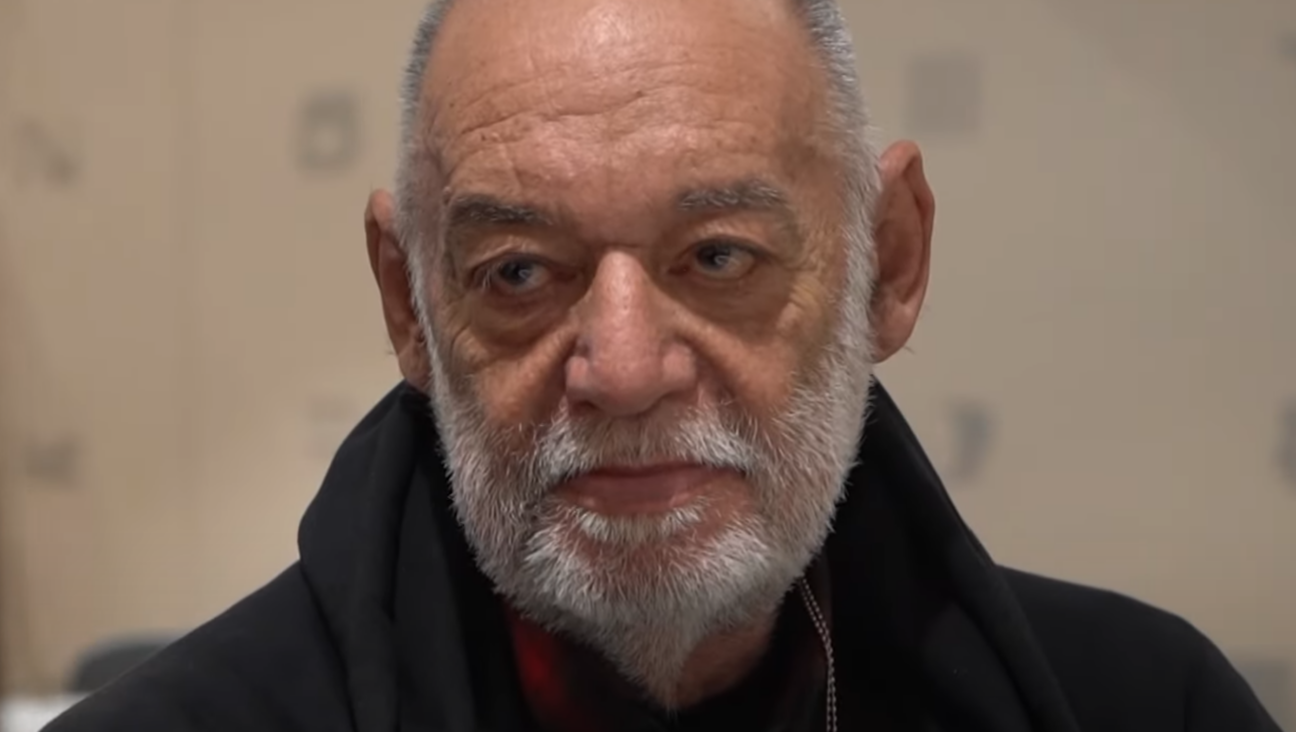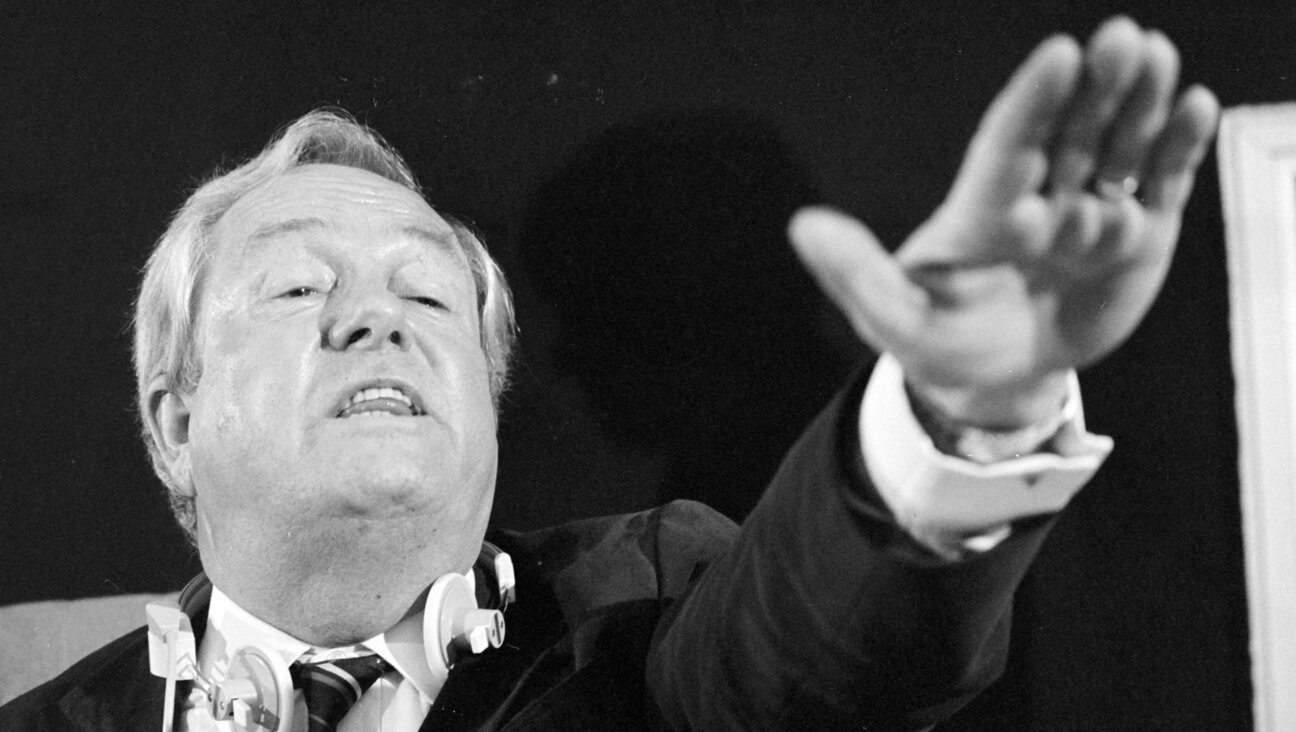Does John Kerry Want Peace Talks More Than Israel or Palestinians?

Lonely Man: There?s a reason why Secretary of State John Kerry announced the resumption of Mideast peace talks by himself on an airport runway in Jordan. It doesn?t bode well for the talks success. Image by getty images
When Secretary of State John Kerry announced on Friday that Israel and the Palestinians had tentatively agreed to resume peace talks after three years, he did so standing alone as dusk fell over the Jordanian capital.
The image reflects both his achievement and his challenge: few people would have predicted success when he began his quest to get the parties into talks nearly six months ago; yet even as he heralded the planned negotiations, neither was at his side.
In a brief appearance at Jordan’s Queen Alia International Airport, Kerry told reporters the Israelis and Palestinians had laid the groundwork to resume direct negotiations.
While acknowledging the agreement was still being “formalized,” he said that “if everything goes as expected” the chief Palestinian and Israeli negotiators would come to Washington to start talks in the next week or so and to make a three-way announcement.
Kerry’s solo appearance – after four days of face-to-face talks with Palestinian officials and intense phone conversations with their Israeli counterparts – may simply have reflected its timing: just as Muslims were breaking their daily Ramadan fast and Jews were beginning to observe the Sabbath.
However, a former senior U.S. official said Kerry appearing alone might also be viewed as a signal that neither the Israelis nor the Palestinians is as deeply committed to the resumption of talks as the U.S. secretary of state himself.
“In a way, the announcement reflects … the degree of investment on both sides and the amount of risk that they are prepared to take, which is apparently not much,” said the senior official, who spoke on condition that he not be identified.
KERRY’S PRAYER ANSWERED
Even before becoming secretary of state, Kerry signaled an ardent interest in trying to resolve the more than six-decade Israeli-Palestinian conflict.
“My hope … my prayer is that perhaps this can be a moment where we can renew some kind of effort to get the parties into a discussion,” he said at his Jan. 24 Senate confirmation hearing.
On the first weekend after he took office on Feb. 1, he telephoned both Israeli Prime Minister Benjamin Netanyahu and Palestinian President Mahmoud Abbas to underscore his “personal commitment” to pursue Middle East peace.
However, aside from Kerry’s devotion to the issue – he has made six peacemaking trips to the region in four months – analysts said they were unable to point to any significant changes in the fundamental climate for peace.
Peacemaking has ebbed and flowed for two decades, last breaking down in late 2010 over Israel’s settlements in the occupied West Bank and East Jerusalem, where, along with the Gaza Strip, Palestinians seek statehood.
The Palestinians, with international backing, have said that state must have borders approximating the territories’ boundaries before Israel captured them in the 1967 Middle East War – a demand hard to reconcile with Israel’s insistence on keeping swaths of settlements under any eventual peace accord.
The core issues that need to be settled include borders, the fate of Palestinian refugees, the future of Jewish settlements in the West Bank and the status of Jerusalem.
Previous attempts by former U.S. Presidents George W. Bush in 2008 and Bill Clinton in 2000 ended in failure.
SEEKING PEACE, OR AVOIDING BLAME?
Some analysts said they saw little as having changed in the politics of the dispute since the last effort, which broke down within weeks of its high-profile Washington announcement.
“I am not among those who see this as a major breakthrough,” said Khaled Elgindy of the Brookings Institution’s Saban Center for Middle East Policy in Washington. “I am very skeptical because I don’t see anything that is fundamentally different.”
The main motivation on both sides to agree to come to the table – assuming that all goes well in the next week or so – may simply be to avoid being blamed for torpedoing negotiations.
“From the Palestinian standpoint the objective is not to be blamed for failure of this process, so they are willing to go along, they are not holding their breath,” said Elgindy, who served as an adviser to the Palestinian leadership on peace negotiations at the Negotiations Support Unit in Ramallah from 2004 to 2009.
For the Israelis, entering talks may also avert a diplomatic disaster at September’s annual U.N. General Assembly, where the Palestinians had planned to seek recognition for their statehood claim in the absence of direct engagement with the Israelis.
The scene as Kerry met Abbas on Friday afternoon in Ramallah after several hours of delay seemed to bear out the idea of some Palestinian skepticism in the face of U.S. enthusiasm.
“Mr. president, you should look happy,” said a cheerful-looking Kerry, according to a U.S. pool reporter who attended the picture-taking session at the start of their talks.
Another question that Elgindy, and others, raised was how committed U.S. President Barack Obama was to the peace process having seen his 2010 attempt fail.
“There is a perception that (Obama) is saying ‘go ahead, I am with you, see what you can accomplish’ but he is not terribly invested in the process,” Elgindy said. “The thinking is that he will be brought in when he is needed, when they make progress, but he is not going to expend the political capital this early.”
The U.S. president did raise Israeli-Palestinian peacemaking with Netanyahu during a telephone call on Thursday, one day before Kerry’s announcement.
Obama urged Netanyahu “to continue to work with Secretary Kerry to resume negotiations with the Palestinians as soon as possible,” according to a White House description of the call.
However, it was unclear how much, if at all, Obama may have influenced the Israeli leader during the call, which the White House described as part of their regular consultations and whose main topics appeared to have been Egypt, Iran and Syria.
There have been years when U.S. officials, faced with their failure to broker an Israeli-Palestinian peace deal, have told reporters: “We can’t want it more than the parties do.”
It is a question that comes up about Kerry’s efforts, which win praise for their apparent early progress but doubts about their odds of eventual success.
“Clearly, Kerry wants it more than Netanyahu or Abbas,” said Elliott Abrams, who served as a deputy national security adviser under Republican U.S. President George W. Bush and was involved in Bush’s failed push for a peace agreement by the end of 2008.
“I don’t think it’s a mystery why that would be. For both Netanyahu and Abbas, these negotiations present enormous political problems and both of them are going to be accused at various points of … giving away too much,” he added. “
A message from our Publisher & CEO Rachel Fishman Feddersen

I hope you appreciated this article. Before you go, I’d like to ask you to please support the Forward’s award-winning, nonprofit journalism so that we can be prepared for whatever news 2025 brings.
At a time when other newsrooms are closing or cutting back, the Forward has removed its paywall and invested additional resources to report on the ground from Israel and around the U.S. on the impact of the war, rising antisemitism and polarized discourse.
Readers like you make it all possible. Support our work by becoming a Forward Member and connect with our journalism and your community.
— Rachel Fishman Feddersen, Publisher and CEO























